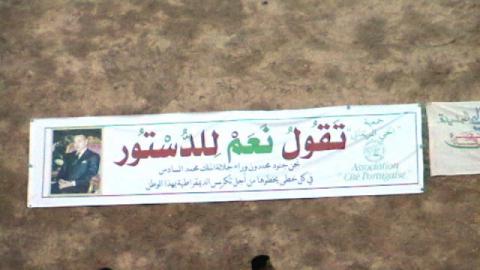
On 22 September 2016, Alkarama submitted its report on Morocco’s human rights situation to the United Nations Human Rights Council (HRC) in view of its third Universal Periodic Review (UPR), which will be held in May 2017. Despite the authorities’ tangible progress in the protection and promotion of human rights, some practices remain in violation of Morocco’s international obligations.
The main concerns raised by Alkarama include the persistence of secret detention and torture, particularly in cases related to the fight against terrorism, the worrying detention conditions of prisoners, as well as the restrictions to the freedoms of expression and peaceful assembly. In its report, Alkarama suggests 15 recommendations to be addressed to Morocco on the occasion of its next UPR, with the intent to strengthen the authorities’ respect for human rights.
The UPR is a unique process which involves a periodic review of the human rights records of all 193 UN Member States by the HRC every four years. The reviews take the form of a discussion/dialogue between the reviewed State and other UN Member States, during which the latter make recommendations with the aim of improving the human rights situation on the ground.
Positive development brought by the 2011 Constitution
The Constitution, adopted by referendum in 2011, offers greater protection of human rights than the last. Moreover, many legislative projects have been undertaken, including reforms of the Penal Code, the Code of Criminal Procedure, the Press Code, as well as a major reform of the judiciary. Simultaneously, the reform of the military justice puts an end to civilian prosecutions in military courts in peacetime.
Persisting violations in the context of the fight against terrorism
However, like its Algerian counterpart, Moroccan law still does not provide a clear, precise and foreseeable definition of acts of terrorism, as required by international law, and the limited procedural safeguards provided, in matters of terrorism, are not enough to prevent torture and ill-treatment. For instance, access to a lawyer is restricted, as detainees are allowed a 30 minute meeting with their lawyer and only under official supervision. Similarly, the length of custody may be extended to 12 days, well beyond the international standards that limit, in principle, the legal period of custody to 48 hours.
Thus, following the Casablanca bombings of 2003, thousands of suspects were arrested and held incommunicado or in secret detention before being convicted -- following unfair trials based on confessions extracted under torture. Following the response of the Opinions of the UN Working Group on Arbitrary Detention (WGAD), which asked for several of them to be released, no decision was undertaken by the Moroccan authorities to re-try or release them. Unfortunately, many remain detained, such as Ali Aarass, Abdessamad Bettar, Mohamed Hajib et Rachid Ghribi Laroussi.
Worrying conditions of detention of prisoners
Improving conditions of detention remains a major challenge for Morocco. The overuse of pre-trial detention has even led to prison overcrowding: in 2014, the prison population stood at 157% of prison capacity.
In addition, numerous prisoners continue to be subjected to ill-treatment. Although, the practice of torture declined significantly, Alkarama has continued to document several cases in the past four years -- such as the case of Abdelkader Halaoui, a human rights activist member of the Moroccan Centre for Human Rights who was arrested on 28 May 2013 and forced to sign confessions under torture without being able to read the transcript of his interrogation. For Halaoui, as for all victims, the issue of impunity remains: judges never follow up on allegations brought to their attention and rare medical examinations are not conducted by independent doctors.
Limited freedoms of expression and peaceful assembly
Although the recently-adopted reform of the Press Code eliminates prison sentences for press offences, the Penal Code still approves prison sentences for undermining national symbols, such as the Moroccan flag, and insulting the monarchy and religion.
Finally, the creation of associations, unions, and political parties, as well as the organisation of protests are strictly regulated and subjected to cumbersome formalities. The police regularly resort to an excessive and unwarranted use of force to disperse peaceful demonstrations.
For more information or an interview, please contact media@alkarama.org (Dir: +41 22 734 1008)
